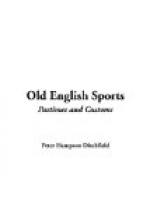The people of Lancashire in the time of James I. were as devoted to sports and amusement as they are now; and when the king was making a progress through Lancashire, “he received a petition from some servants, labourers, mechanics, and other vulgar persons, complaining that they were debarred from dancing, playing, church-ales—in a word, from all recreations on Sundays after Divine service.” King James hated Puritanism and loved recreation; so he readily granted the petition of the Lancashire folk, and issued a proclamation encouraging Sunday pastimes, which is known as the famous “Book of Sports.”
In Ireland on May Day Bale-fires are lighted, and to this day young men jump through the flames, and children are passed across the embers, in order to secure them good luck during the coming year. On this day, too, the Irish kings are supposed to rise from their graves and gather together a ghostly army of rude warriors to fight for their country. The wild cries of the shadowy host, the clashing of shields, and the sound of drums are said to have been heard during the period of the last rebellion in Ireland.
On one of the Rogation Days, or on Ascension Day, it was the custom to go in procession round the boundaries of the parish to ask God’s blessing on the fruits of the earth, and as there were few maps and divisions of land, to call to mind and pass on to the next generation the boundaries of the township or village. The choir sang hymns, and under certain trees, which were called Gospel Trees, the clergyman read the Gospel for the day, with a litany and prayers. Sometimes boys were whipped, or bumped against trees, or thrown into a river, in order to impress upon them where the boundaries were. But they received a substantial recompense afterwards, and the whole company, when the procession was over, sat down to the perambulation dinner, and talked about their recollections of former days.
The advantages of this practice are set forth in George Herbert’s description of a country parson. He says, “The country parson is a lover of old customs, if they be good and harmless. Particularly he loves procession, and maintains it, because there are contained in it four manifest advantages, 1. A blessing of God for the fruits of the earth. 2. Justice in the preservation of bounds. 3. Charity, in loving, walking, and neighbourly accompanying one another, with reconciling of differences at that time, if there be any. 4. Mercy, in relieving the poor by a liberal distribution and largess, which at that time is, or ought to be, used. Wherefore he exacts of all to be present at the perambulation, and those that withdraw and sever themselves from it he mislikes, and rebukes as uncharitable and unneighbourly; and if they will not reform, presents them” (i.e. to the bishop for censure).
This custom is still preserved, or has been revived, in many parishes, and at Oxford the boys may be seen on Ascension Day bearing white willow-wands, and beating the bounds of some of the old city parishes.




